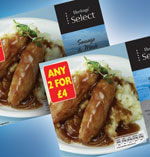Symbol store own-label food quality needs to rise
 Own-label food manufacturers need to raise the image and quality of products supplied to ‘symbol’ stores if they are to convince shoppers that they are as good as those offered by multiple supermarket chains.
Own-label food manufacturers need to raise the image and quality of products supplied to ‘symbol’ stores if they are to convince shoppers that they are as good as those offered by multiple supermarket chains.
This is particularly important as the symbol stores try to fight off competition from the major multiple retailers, which have moved into the convenience sector in recent years with lower price customer offers, it has been claimed.
Speaking at the IGD Symbol Groups 2013 conference in London yesterday (May 8), Michael Freedman, shopper insight manager for IGD, reported on the grocery think tank’s latest ShopperVista research. It showed shoppers perceived the quality of own-label foods sold by symbol stores to be inferior to that sold by the multiples or Co-operative stores.
‘Private-label is now a fundamental’
“Private-label is now a fundamental part of the convenience channel,” said Freedman. Good value was seen as a key part of own-label products, with 42% of shoppers believing own-label offered better value for money, he added: “There is definitely work to do on improving quality perceptions.”
Over recent years multiples had worked hard with their own-label suppliers, for example through Sainsbury’s ‘Taste the Difference’ and Tesco’s ‘Finest’ top-end ranges, to match the quality of equivalent branded products. Freeman said it was important for symbol stores to differentiate themselves from the multiples, while still offering hard-pressed consumers value for money.
Freedman noted that today’s “savvy shoppers” were looking for money-saving offerings, stores that showcased quality – including good own-label products– and “real deals” in their purchases, such as more systematic reduced price offers for products approaching their ‘use-by dates’ or ‘£1 zones’ in stores. The priorities from the ShopperVista consumer research were saving money spent on groceries, reducing food waste and keeping to a budget, he added.
Focusing on products targeted at smaller households and single person households might be a solution for some independent stores, he suggested, since this would help them reduce waste and therefore cost. He cited Kingsmill’s ‘Little Big Loaf’ as a good example of this approach.
Kingsmill’s ‘Little Big Loaf’
“Symbol stores are really well positioned to benefit from this trend,” he said.
There is considerable consolidation underway in the convenience food sector. Symbol groups such as Nisa, Spar, Premier and Costcutter are growing in strength as more and more independent corner shops find it increasingly difficult to compete with the multiples, which have moved heavily into the convenience store sector in reach years.
IGD chief economist James Walton reported that convenience store numbers were expected to increase by 5% a year for the next five years.
As the convenience sector became less “fragmented”, this would offer good prospects for suppliers, which would find the sector easier to deal with, he added.
However, he warned that a “new recipe is required” if symbol stores were to compete successfully with convenience stores operated by the multiples retailers. He suggested they needed to compete in areas where the multiples were less effective, taking advantage of local connections and a local focus, or meeting the health needs of consumers. However, it would be critical for symbol stores to differentiate themselves, he stressed.


































